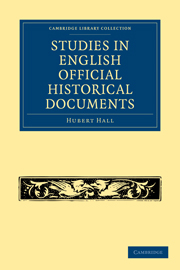Book contents
- Frontmatter
- PREFACE
- Contents
- ERRATA
- PART I THE SOURCES OF OFFICIAL HISTORICAL DOCUMENTS
- PART II THE DIPLOMATIC OF OFFICIAL HISTORICAL DOCUMENTS
- INTRODUCTION TO THE DIPLOMATIC STUDY OF OFFICIAL DOCUMENTS
- THE ANGLO-SAXON CHARTERS
- ANGLO-NORMAN CHARTERS AND WRITS
- LATER CHARTERS AND DIPLOMATIC INSTRUMENTS
- LETTERS, STATE PAPERS AND DEPARTMENTAL INSTRUMENTS
- ROYAL SURVEYS, INQUISITIONS AND ASSESSMENTS
- ROYAL ACCOUNTS
- JUDICIAL PROCEEDINGS
- APPENDIX I A Classified Table of Diplomatic Instruments
- APPENDIX II Early Diplomatic Criticism
- APPENDIX III The Charters of King Athelstan (Concordance of Formulas)
- APPENDIX IV Table showing the Relationship of the Pre-Conquest and Post-Conquest Diplomata
- APPENDIX V Documents connected with the Issue of the Great Seal (1662)
- APPENDIX VI Fees of the Seal
- APPENDIX VII Note on the Bibliography of English Diplomatic
- PART III THE PALAEOGRAPHY OF OFFICIAL DOCUMENTS
- TABLE OF MATTERS
ROYAL SURVEYS, INQUISITIONS AND ASSESSMENTS
Published online by Cambridge University Press: 07 September 2010
- Frontmatter
- PREFACE
- Contents
- ERRATA
- PART I THE SOURCES OF OFFICIAL HISTORICAL DOCUMENTS
- PART II THE DIPLOMATIC OF OFFICIAL HISTORICAL DOCUMENTS
- INTRODUCTION TO THE DIPLOMATIC STUDY OF OFFICIAL DOCUMENTS
- THE ANGLO-SAXON CHARTERS
- ANGLO-NORMAN CHARTERS AND WRITS
- LATER CHARTERS AND DIPLOMATIC INSTRUMENTS
- LETTERS, STATE PAPERS AND DEPARTMENTAL INSTRUMENTS
- ROYAL SURVEYS, INQUISITIONS AND ASSESSMENTS
- ROYAL ACCOUNTS
- JUDICIAL PROCEEDINGS
- APPENDIX I A Classified Table of Diplomatic Instruments
- APPENDIX II Early Diplomatic Criticism
- APPENDIX III The Charters of King Athelstan (Concordance of Formulas)
- APPENDIX IV Table showing the Relationship of the Pre-Conquest and Post-Conquest Diplomata
- APPENDIX V Documents connected with the Issue of the Great Seal (1662)
- APPENDIX VI Fees of the Seal
- APPENDIX VII Note on the Bibliography of English Diplomatic
- PART III THE PALAEOGRAPHY OF OFFICIAL DOCUMENTS
- TABLE OF MATTERS
Summary
Agrarian Surveys
The origin of the English royal Inquest, which has produced one of the largest and most important classes of our Public Records, may or may not be found in the precisely similar device employed in the administrative system of the Frankish kingdom. Such an origin has been assumed in the case of the native diplomata on evidence of a far less substantial character. Nevertheless we are warned that the close resemblance between the laws and ministerial proceedings on either side is nothing more than plausible analogy. To derive one constitutional practice from the other would, we are told, be positively unsafe. It is fortunately unnecessary, for the purpose of a diplomatic comparison, to press this interesting analogy any further. The preexistence of certain diplomatic forms in the court of Charles the Great may be noticed without insisting that the constitutional procedure which those forms might imply was borrowed from this foreign source by the Conqueror or his predecessors. The suggestion, however, is so obvious that it can scarcely be suppressed.
The resemblance which is observable between the Frankish and Anglo-Norman systems of agrarian valuation is rendered still more striking by the use in both of identical formulas and terms which often have a technical significance. In both cases, moreover, it is noticeable that the Inquisition as a piece of ministerial procedure may not only be employed for distinct purposes on several occasions, but for all of these purposes at one and the same time.
- Type
- Chapter
- Information
- Studies in English Official Historical Documents , pp. 281 - 306Publisher: Cambridge University PressPrint publication year: 2010First published in: 1908

